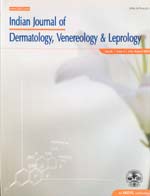
|
Indian Journal of Dermatology, Venereology and Leprology
Medknow Publications on behalf of The Indian Association of Dermatologists, Venereologists and Leprologists (IADVL)
ISSN: 0378-6323
EISSN: 0378-6323
Vol. 76, No. 6, 2010, pp. 602-609
|
 Bioline Code: dv10190
Bioline Code: dv10190
Full paper language: English
Document type: Review Article
Document available free of charge
|
|
|
Indian Journal of Dermatology, Venereology and Leprology, Vol. 76, No. 6, 2010, pp. 602-609
| en |
Golimumab and certolizumab: The two new anti-tumor necrosis factor kids on the block
Mittal, Mohit & Raychaudhuri, Siba P.
Abstract
Anti-tumor necrosis factor (anti-TNF) agents have revolutionized treatment of psoriasis and many other inflammatory diseases of autoimmune origin. They have considerable advantages over the existing immunomodulators. Anti-TNF agents are designed to target a very specific component of the immune-mediated inflammatory cascades. Thus, they have lower risks of systemic side-effects. In a brief period of 10 years, a growing number of biological therapies are entering the clinical arena while many more biologicals remain on the horizon. With time, the long-term side-effects and efficacies of these individual agents will become clearer and help to determine which ones are the most suitable for long-term care. Golimumab (a human monoclonal anti-TNF-α antibody) and Certolizumab (a PEGylated Fab fragment of humanized monoclonal TNF-α antibody) are the two latest additions to the anti-TNF regimen. Here, we are providing a brief description about these two drugs and their uses.
Keywords
Anti-tumor necrosis factor agents, Certolizumab, Golimumab
|
| |
© Copyright 2010 Indian Journal of Dermatology, Venereology, and Leprology.
Alternative site location: http://www.ijdvl.com
|
|
